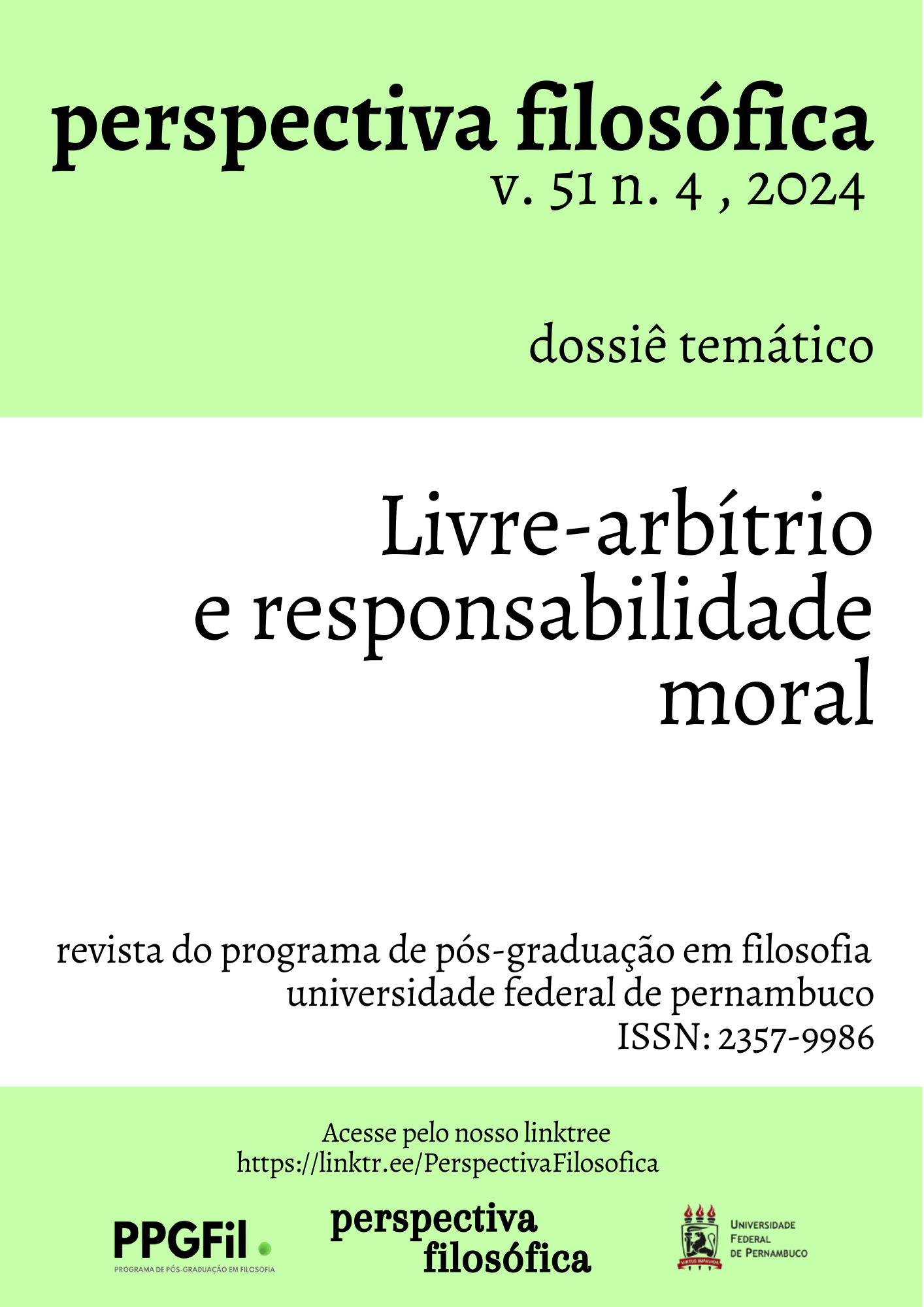Presentation, list of referees and summary
Keywords:
Moral, responsability, Free will, Reviewers, Summary, ApresentaçãoAbstract
Discussions about free will and moral responsibility are long traditions in Western Philosophy. These topics and their focus on causal determinism have been the object of increased interest since the second half of the last century, and currently, their developments have unfolded in so many different directions that the amount of literature is daunting. Still, there seem to be many paths yet to be explored beyond the opposition between free will and determination of action, and whether their compatibility or incompatibility may ground moral responsibility.
Nonetheless, it is undeniable that the compatibility problem has been the main focus of philosophers in discussions about free will. The issue can roughly be construed as whether free will and causal determination are compatible or incompatible. Incompatibilists usually conceive of free will as the ability to do otherwise, all else remaining the same, and they do not accept that it is compatible with causal determinism. On the other hand, compatibilists disagree although they may use different strategies. Some focus on the conception of free will, and others, for instance, on the idea that our interest in free will is based on its relevance to moral responsibility, therefore, it becomes more important to show the compatibility of moral responsibility with determinism, and they attempt to do just that.
The connection between free will and moral responsibility is not always explicitly spelled out, but the point of intersection concerns whether the agent deserves to be held responsible. It is crucial to distribute blame or praise only to the agents who deserve it, and many philosophers are persuaded that to deserve to be held accountable for an action, one must have had free will when one acted. Simply put, the agent must have been able to decide whether to perform that action or not. If the agent cannot make such a choice, if she can only act as she does, due to her action being causally determined, then incompatibilists, for instance, believe that she lacks free will, therefore, she cannot be held responsible for her action. Hence, free will has been considered a necessary condition for moral responsibility by many, but not all, and this disagreement is at the core of the debate.
On the subject of moral responsibility, the approaches and focuses are diverse. In the second half of the 20th century, many theories presupposed a compatibilist view and moved away from the free will condition towards other attempts to unravel the grounds for holding an agent morally responsible. Some defend that such grounds depend on whether the action reflects their character, or quality of the will, or tracks the agent's reasons for the action, among other proposals.
Furthermore, some new discussions have arisen in the past decade; I highlight the recent interest in the controversial epistemic condition for moral responsibility, which requires that to be held responsible, the agent must be aware of the moral significance of her action. Additionally, fresh perspectives of the traditional discussions have been presented by feminist philosophers, who point out problems in the debate, such as asymmetries in moral responsibility attribution. One prominent name is Michelle Ciurria, who wrote An Intersectional Feminist Theory of Moral Responsibility and contributed to this Special Issue with the paper Reclaiming Responsibility: An Ameliorative Proposal.
Discussions about Free Will and Moral Responsibility, however, have had a much smaller place in Brazilian Philosophy than abroad. This Special Issue aims to contribute to the debate by propagating it and encouraging discussions on the topics, both traditional and recent ones. Additionally, it seeks to connect these discussions to the cutting-edge debate abroad.
In the Special Issue Free Will and Moral Responsibility, the published papers explore different aspects of the main theme, from the historical discussions about free will and its relevance to moral responsibility, as well as present more recent ideas that highlight novel aspects of the debate that intersect with epistemology, philosophy of mind, and political philosophy.
References
Beatriz Sorrentino Marques
Universidade Federal de Mato Grosso (UFMT)
Editora convidada
Additional Files
Published
Issue
Section
License
Copyright (c) 2024 Beatriz Sorrentino Marques

This work is licensed under a Creative Commons Attribution 4.0 International License.
A Revista Perspectiva Filosófica orienta seus procedimentos de gestão de artigos conforme as diretrizes básicas formuladas pelo Conselho Nacional de Desenvolvimento Científico e Tecnológico (CNPq). http://www.cnpq.br/web/guest/diretrizesAutores que publicam nesta revista concordam com os seguintes termos:
Os autores mantém os direitos autorais e concedem à revista o direito de primeira publicação, sendo o trabalho simultaneamente licenciado sob https://creativecommons.org/licenses/by/4.0/deed.pt_BR que permite o compartilhamento do trabalho com reconhecimento da autoria e publicação inicial nesta revista.
Os autores têm autorização para assumir contratos adicionais separadamente, para distribuição não-exclusiva da versão do trabalho publicada nesta revista, com reconhecimento de autoria e publicação inicial nesta revista (Consultar http://opcit.eprints.org/oacitation-biblio.html).

Esta revista está licenciada com uma Licença Creative Commons Atribuição 4.0 Internacional.













